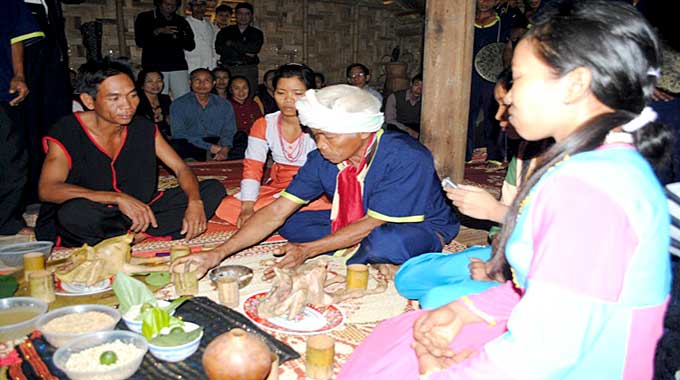The Raglai people have several ceremonies relating to the life cycle of a man or a tree. The new rice ceremony is the biggest event of all.

After harvesting and stockpiling rice in warehouses, the Raglai organize a ritual to thank the heaven God, genies, and ancestors for blessing them with a bumper crop.
The Raglai believe that there are several genies in nature and the heaven god, the supernatural power, is the rice soul who influences production and people’s life.
During a new rice ceremony, people welcome the Heaven God or the rice soul from the terraced fields to celebrate Tet with them and pray them for a better new year. Old Raglai people say the time-honored ritual shows their gratitude toward the rice soul for reproduction and food.
Mau Quoc Tien, a researcher of Raglai culture, said Raglai people depend greatly on agricultural production and the new rice ceremony is an indispensable ritual in their life. They pray the genies for favorable weather and good harvest. A ceremony is organized for the extended family to show their gratitude to other villagers for helping them grow and harvest rice.
The Raglai organize the new rice ceremony in the 3rd or 4th lunar month when the first peal of thunder signals the beginning of summer.
Men make a Neu tree and repair their stilt house and altar to welcome their ancestors. Women prepare an offering which must include chicken, rice, corn, betel leaves, areca nuts, and alcohol. The shaman practices the ritual under the Neu tree, which is considered the house of the rice soul. He thanks the Heaven God for blessing people with good health and sufficient food and invites the god to enjoy the offerings. After praying, all family members drink the offering wine together as a gift from god for good health and happiness.
The festival follows the worshiping ceremony. People drink wine from vases, sing, and play Ma La gongs through the night.
Patriarch Mang Khe said all clans organize a new rice ceremony. Each family organizes a ceremony and invites all the villagers to join. They pray for good results in whatever they grow. We show our gratitude to our ancestors and they give us food.
The ceremony is an opportunity for all villagers to make beautiful Neu trees, cook rice in bamboo tubes, distill wine in vases, compete at shooting a crossbow, and play musical instruments, and for relatives to get together and resolve all their differences.